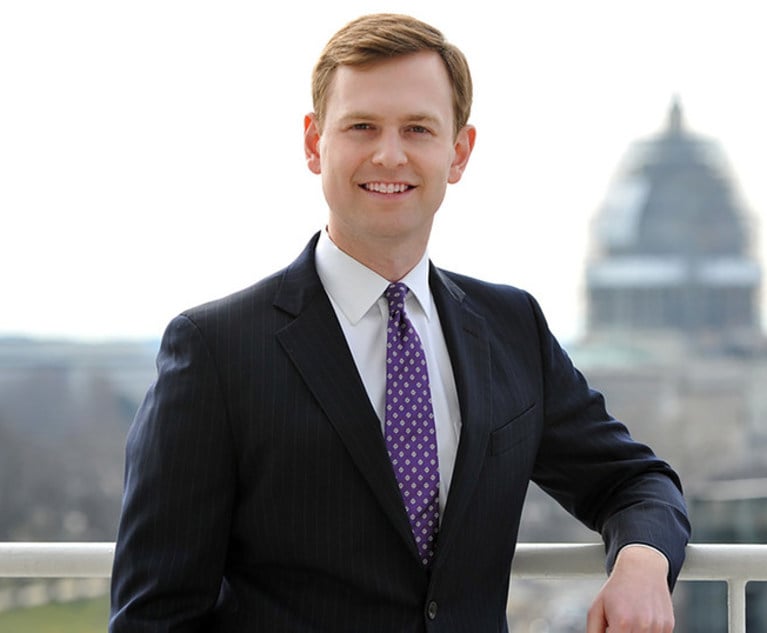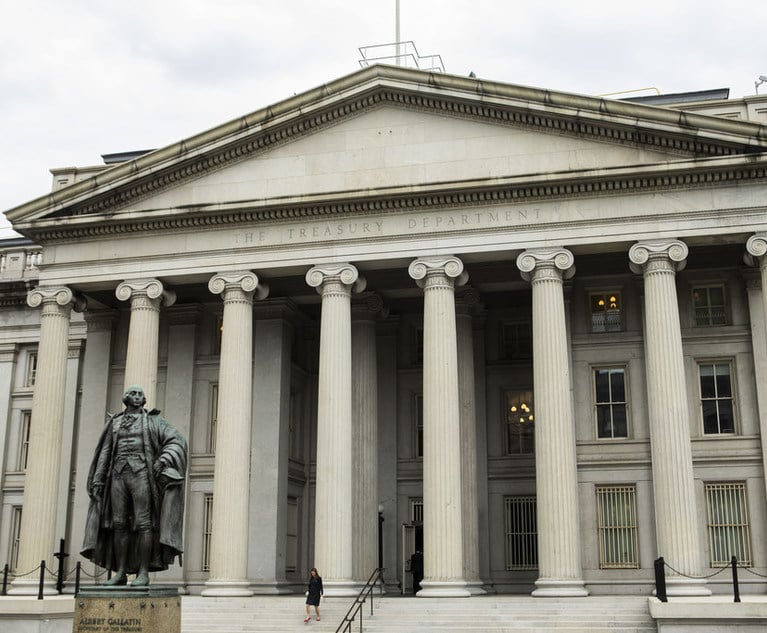The division of the IRS responsible for tax exemptions has failed to do its job
Is it fear or incompetence that keeps the IRS from enforcing a social welfare electioneering rule?
January 27, 2013 at 07:00 PM
4 minute read
Unfortunately, we've become used to a gridlocked government. But in a democracy, we tend to tolerate congressional failures because re-election constitutes our consent to whatever they do—or don't do.
It is a different story when unelected government employees fail to do their jobs. If, say, an entire IRS division responsible for tax-exemption issues simply ignores a long-standing lack of enforcement of the Tax Code, we should not chalk it up to politics. We want to hear another explanation such as incompetence, laziness, lack of staff, even malfeasance. Any of those explanations is easier to accept than the idea that civil servants fear political repercussions simply for doing their jobs.
So how do you explain the IRS's failure to enforce the rule prohibiting so-called “social welfare” organizations from spending more money on electioneering than on enhancing social welfare? During the past two election cycles there has not been a more high-profile issue at the IRS's feet than the millions of dollars that Sec. 501(c)(4) tax-exempt organizations (both conservative and liberal) are spending directly on the congressional and presidential elections. Certainly the best-known such entity is Karl Rove's group, Crossroads GPS, which applied for a tax exemption and, apparently, has not yet been granted that status. In its application, which was released in December 2012, apparently without IRS permission, Crossroads said it would spend 20 percent of its money on research and some on elections, but also said such election spending “will be limited in amount, and will not constitute [our] primary purpose”—thereby meeting the regulatory standard.
Yet, according to news reports, of a total $64.7 million Crossroads reported in tax filings over 19 months, only 2 percent was spent on research. The rest of the money may or may not have been spent on elections, but the press attention given the group from its inception suggests its real purpose was politics rather than the general social welfare.
If the IRS staff was not reading the papers or other media outlets, then it certainly heard from other interest groups badgering it to investigate and take action on abuses of the tax laws by these (c)(4) groups improperly claiming tax-exempt status. Indeed, two groups, Democracy 21 and the Campaign Legal Center, say they wrote the IRS 10 times during 2011 and 2012 to take action. In one response, they got an IRS official to say “the IRS is aware of the current public interest in this issue” and that it would “consider proposed changes in this area.” But nothing happened.
In the meantime, these (c)(4)s continued raising and spending money on elections and perverting the campaign finance disclosure laws by keeping the names of their donors secret—as the law allows them to do. The news media covered the issue like a blanket, pointing out the cynical use of non-profit status to shield the identities of campaign donors, the overall failure of our election laws and the failure of the IRS to act.
After the most expensive election cycle in our history, the question then became whether the IRS would finally “consider proposed changes in this area,” as it had promised earlier in the year.
We got the truly remarkable answer in November 2012. In its announcement of its “priority” projects for the coming year, guess what? The agency made no mention of the social welfare organization issue that had raised the ire of so much of the public and the political class only weeks before. The IRS listed 13 priorities related to exempt organizations, but it couldn't find room to add just one more—the only issue, probably, that anybody outside the inner circle of tax lawyers had ever heard of.
Why is the agency refusing to do its job? Is it fear? Incompetence? Between the two, I'd prefer it be incompetence, because the alternative is too disturbing.
Bruce D. Collins is corporate vice president and general counsel of C-SPAN, based in Washington, D.C. Email him at [email protected].
This content has been archived. It is available through our partners, LexisNexis® and Bloomberg Law.
To view this content, please continue to their sites.
Not a Lexis Subscriber?
Subscribe Now
Not a Bloomberg Law Subscriber?
Subscribe Now
NOT FOR REPRINT
© 2025 ALM Global, LLC, All Rights Reserved. Request academic re-use from www.copyright.com. All other uses, submit a request to [email protected]. For more information visit Asset & Logo Licensing.
You Might Like
View All
Internal Whistleblowing Surged Globally in 2024, So Why Were US Numbers Flat?
6 minute read
FTC Finalizes Child Online Privacy Rule Updates, But Ferguson Eyes Further Changes

Supreme Court Reinstates Corporate Disclosure Law Pending Challenge
Trending Stories
Who Got The Work
J. Brugh Lower of Gibbons has entered an appearance for industrial equipment supplier Devco Corporation in a pending trademark infringement lawsuit. The suit, accusing the defendant of selling knock-off Graco products, was filed Dec. 18 in New Jersey District Court by Rivkin Radler on behalf of Graco Inc. and Graco Minnesota. The case, assigned to U.S. District Judge Zahid N. Quraishi, is 3:24-cv-11294, Graco Inc. et al v. Devco Corporation.
Who Got The Work
Rebecca Maller-Stein and Kent A. Yalowitz of Arnold & Porter Kaye Scholer have entered their appearances for Hanaco Venture Capital and its executives, Lior Prosor and David Frankel, in a pending securities lawsuit. The action, filed on Dec. 24 in New York Southern District Court by Zell, Aron & Co. on behalf of Goldeneye Advisors, accuses the defendants of negligently and fraudulently managing the plaintiff's $1 million investment. The case, assigned to U.S. District Judge Vernon S. Broderick, is 1:24-cv-09918, Goldeneye Advisors, LLC v. Hanaco Venture Capital, Ltd. et al.
Who Got The Work
Attorneys from A&O Shearman has stepped in as defense counsel for Toronto-Dominion Bank and other defendants in a pending securities class action. The suit, filed Dec. 11 in New York Southern District Court by Bleichmar Fonti & Auld, accuses the defendants of concealing the bank's 'pervasive' deficiencies in regards to its compliance with the Bank Secrecy Act and the quality of its anti-money laundering controls. The case, assigned to U.S. District Judge Arun Subramanian, is 1:24-cv-09445, Gonzalez v. The Toronto-Dominion Bank et al.
Who Got The Work
Crown Castle International, a Pennsylvania company providing shared communications infrastructure, has turned to Luke D. Wolf of Gordon Rees Scully Mansukhani to fend off a pending breach-of-contract lawsuit. The court action, filed Nov. 25 in Michigan Eastern District Court by Hooper Hathaway PC on behalf of The Town Residences LLC, accuses Crown Castle of failing to transfer approximately $30,000 in utility payments from T-Mobile in breach of a roof-top lease and assignment agreement. The case, assigned to U.S. District Judge Susan K. Declercq, is 2:24-cv-13131, The Town Residences LLC v. T-Mobile US, Inc. et al.
Who Got The Work
Wilfred P. Coronato and Daniel M. Schwartz of McCarter & English have stepped in as defense counsel to Electrolux Home Products Inc. in a pending product liability lawsuit. The court action, filed Nov. 26 in New York Eastern District Court by Poulos Lopiccolo PC and Nagel Rice LLP on behalf of David Stern, alleges that the defendant's refrigerators’ drawers and shelving repeatedly break and fall apart within months after purchase. The case, assigned to U.S. District Judge Joan M. Azrack, is 2:24-cv-08204, Stern v. Electrolux Home Products, Inc.
Featured Firms
Law Offices of Gary Martin Hays & Associates, P.C.
(470) 294-1674
Law Offices of Mark E. Salomone
(857) 444-6468
Smith & Hassler
(713) 739-1250







